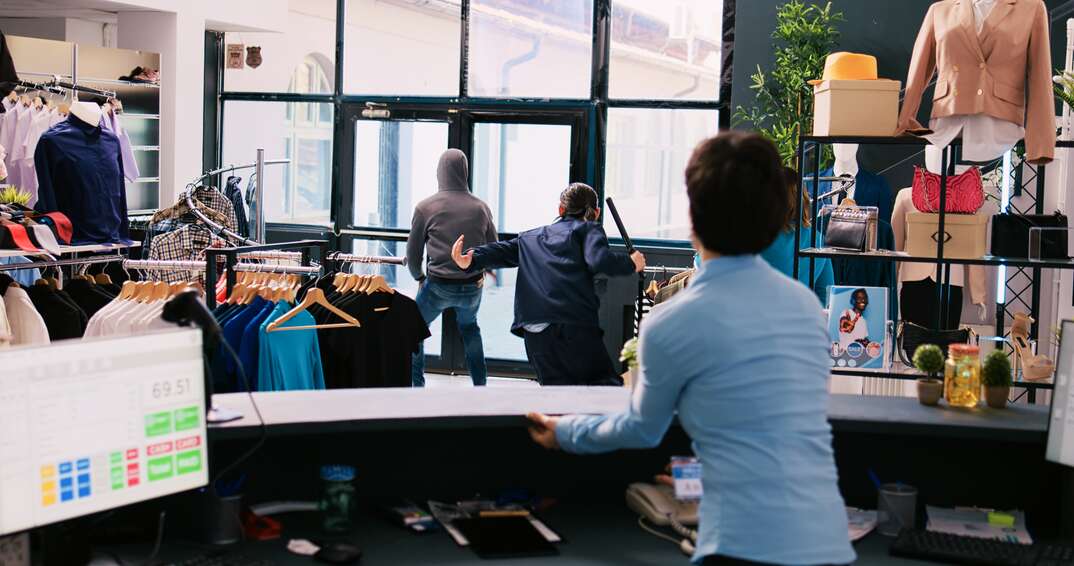- AppliancesElectriciansHVACLandscapingLocksmithPest ControlPlumbingRenovationRoofingT V RepairAll Home Improvement
- Car AccidentClass ActionCorporate LawCriminal DefenseDivorce LawEmployment LawFamily LawFinancial LawLegal AidMedical Injury LawyersMedical MalpracticeReal Estate LawWater Fire RestorationAll Legal
- InvestmentRetirementAll Finance
- Animal InsuranceAutoGeneral InsuranceHealth PolicyHome RentersAll Insurance
- DentalHealth SpecialistsAll Medical
- Animal CareVeterinaryAll Pets
- Auto GlassTowingAll Automotive
Shoplifting: Everything to Know About Retail Theft

Shoplifting is a serious crime, and it's also a common one. People who shoplift take items from a store without paying for them, and shoplifting can involve anything from inexpensive trinkets or snacks to high-value items such as electronics or luxury goods.
Almost every type of physical store has to deal with retail theft, including grocery stores, boutiques, department stores and big-box chains.
Shoplifting is the crime of taking unpurchased merchandise from a retail establishment, typically while pretending to be a shopper or browser at the store. Someone doesn't have to actually leave the store to be charged with shoplifting, though. If someone hides or conceals merchandise with the intent to remove it from the store, this may also fall under the legal definition of shoplifting.
What Differentiates Shoplifting From Other Types of Theft?
One big difference between the crime of shoplifting and other types of theft is that it involves a store, not an individual victim. Someone who steals personal property or money from an individual is charged differently than someone who steals items that were on display for sale at a store.
Theft of money from a store is also considered a separate crime from shoplifting. A thief who robs a store and steals money from the cash register or from workers in the store is typically charged with a different type of crime.
Internal theft, in which an employee steals money or goods from the store, is another type of retail crime unrelated to shoplifting. Theft in stores may also be a collaborative crime committed by a team that includes both employees and non-employees. In this case, the employees may allow friends or co-conspirators to shoplift items or alter tags, receipts and security devices to make the stolen items appear to be a legitimate purchase.
Store policies about shoplifting vary by retail chain and location. Some states have specific laws about whether and how store employees can detain suspected shoplifters. Many stores have policies to only prosecute theft of goods over a specific dollar amount.
Stores with a robust security and loss prevention department may have internal policies restricting employees from chasing shoplifters out of the store or even confronting shoplifters directly. Some chains address stealing in stores by locking up items that are frequently targeted for theft, such as laundry detergent, cell phones or expensive accessories. Items locked in glass cases allow customers to see the items while browsing but require an employee to open the case before the actual purchase.
More Related Articles:
- When Do You Need a Lawyer? Determine If You Need to Hire an Attorney
- What Is a Class-Action Lawsuit?
- What Is a Misdemeanor?
- What to Do After a Car Accident
- What Is Power of Attorney?
What Are the Potential Consequences of Shoplifting?
Shoplifting can have lifelong consequences. In some cases, the shoplifter can be detained by police and arrested for theft. While jail sentences are rare for shoplifting, civil penalties may include a large fine. People caught shoplifting are often put into a database that's accessible by other store owners and managers in the area. An identified shoplifter may be banned from specific stores.
While the chances of getting caught shoplifting after leaving a store are lower than getting caught while still inside the store, there are still potential consequences even if someone gets away with the crime. Security cameras inside the store might have captured the perpetrator's image, which can be passed on to law enforcement or put in a database of individuals for local stores to watch carefully in the future.
What Can Happen to Repeat Offenders?
The consequences of shoplifting often increase with subsequent charges. If someone is a repeat offender, they may incur higher fines or risk jail time, even if they got away with their first offense.
Is Shoplifting a Felony?
Whether a specific incident of shoplifting gets charged as a felony or misdemeanor usually comes down to the dollar value of the stolen items and whether this is the person's first offense. First-time offender retail theft is often charged as a misdemeanor, particularly if the dollar value of the stolen items is low. State laws may set a specific dollar amount as the threshold for charging someone with a felony.
Why Do People Shoplift?
In some cases, people shoplift to acquire goods they can't afford. Some shoplifters steal for the thrill of getting away with a crime and don't need or want the stolen merchandise at all. Shoplifting can also be part of organized crime, in which case the stolen goods are resold, not taken for personal use.
Elocal Editorial Content is for educational and entertainment purposes only. The information provided on this site is not legal advice, and no attorney-client or confidential relationship is formed by use of the Editorial Content. We are not a law firm or a substitute for an attorney or law firm. We cannot provide advice, explanation, opinion, or recommendation about possible legal rights, remedies, defenses, options or strategies. The opinions, beliefs and viewpoints expressed by the eLocal Editorial Team and other third-party content providers do not necessarily reflect the opinions, beliefs and viewpoints of eLocal or its affiliate companies. Use of the Blog is subject to the
Website Terms and Conditions.The eLocal Editorial Team operates independently of eLocal USA's marketing and sales decisions.



